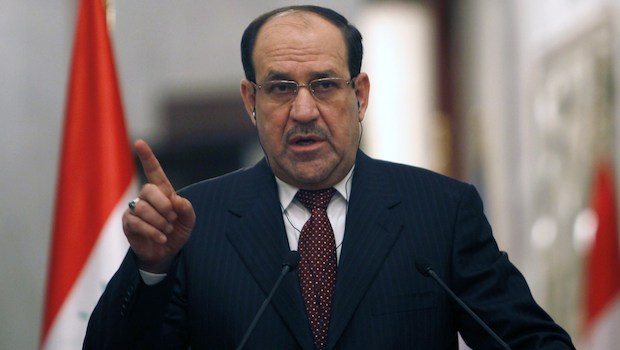Baghdad and Erbil, Asharq Al-Awsat—Iraq’s Sunni Arab, Shi’ite and Kurdish political parties are exchanging accusations over the recent victories by the Islamic State of Iraq and Syria (ISIS) in the country, amid fears of the outbreak of a sectarian civil war.
The State of Law coalition, led by Iraqi Prime Minister Nuri Al-Maliki, accused Kurdish and Sunni Arab parties of collaborating with ISIS in the events that led to the group’s capture of Iraq’s second city, Mosul, last week.
Haitham Al-Jabouri, a senior member of the State of Law coalition, accused Kurdistan Region President Massoud Barzani and Iraqi parliamentary speaker and Sunni Mutahidoun bloc leader Osama Al-Nuajifi of conspiring together against the central government in Baghdad.
“Nujaifi is working on establishing a Sunni state in order to control its resources,” he said.
Jabouri cited the Kurdish Peshmega forces’ capture of the contested city of Kirkuk as proof of the conspiracy.
Kurdistan Regional Government (KRG) official spokesperson Safin Dizayee rejected the State of Law official’s allegations as being “irresponsible and worthless.”
“The failure of the Iraqi government in Mosul and other areas was very clear. The Iraqi Army, which has a huge budget and has a total of around 800,000 troops, was unable to stand up to just a few hundreds insurgents,” he said.
Local and international media have reported that Iraqi soldiers exchanged their uniforms for civilian clothing and fled the initial assault. Iraqi soldiers, speaking to Asharq Al-Awsat from Erbil earlier this week, claimed that senior military officials fled bases in Mosul without warning the troops and that junior officers subsequently took the decision to order soldiers to retreat. The soldiers accused the Iraqi military leadership of “treason” and denied being deserters.
“The Iraqi Army commanders fled, so no one else can be blamed for the retreat other than the Iraqi government and its failed policies, which are the main cause of the problem. The Iraqi military is established on weak foundations, as the government has relied on unqualified cadres,” the KRG spokesman told Asharq Al-Awsat.
Iraq’s Sunni-led Mutahidoun bloc, which has been a strong critic of the Maliki government, has also condemned the State of Law coalition’s statements. Mutahidoun spokesman Mohamed Al-Khalidi told Asharq Al-Awsat: “The statements coming from the State of Law leadership are part of the failed policies that the government has suffered from under eight years of Nuri Al-Maliki rule. They find it easy to make such accusations, but the cost of this may be high, especially when these accusations are not based on any evidence.
“The collapse of the army is not Osama Al-Nujaifi’s responsibility. This is the responsibility of the prime minister’s because he is solely in charge of the security dossier in Iraq. Therefore, the blame must lie with those in charge of the security dossier and they must hold the military leaders who refused to fight to account.”
Nuri Al-Maliki, who is seeking a third term in office following elections earlier this year, has served as Iraq’s acting interior and defense ministers since the start of his second term.
The Mutahidoun spokesman sought to downplay ISIS’s role in the recent unrest in Iraq, portraying the situation as part of a larger Sunni Arab uprising. Reports from the ground in Iraq confirm that local Sunni Arab tribes are assisting the Islamist militants, although it is unclear whether this is part of a coordinated plan or if they are taking advantage of the chaos.
Iraq’s Sunni Arabs have been increasingly frustrated by the central government in Baghdad and Shi’ite Prime Minister Nuri Al-Maliki, who many believe is promoting a sectarian agenda.
“The anger in Nineveh and Salah Al-Din governorates is nothing new. There have been protests and sit-ins there from around two years ago, putting forward our legitimate demands to the central government. But Baghdad has constantly ignored these [demands], leading to public anger as a result of misguided government policies towards the people there,” Khalidi told Asharq Al-Awsat.
“What is happening in Nineveh and Salah Al-Din was legitimate public protest, but it has been exploited by terrorist groups which will be expelled by the people of those areas,” he added.
Hamza Mustafa contributed reporting

